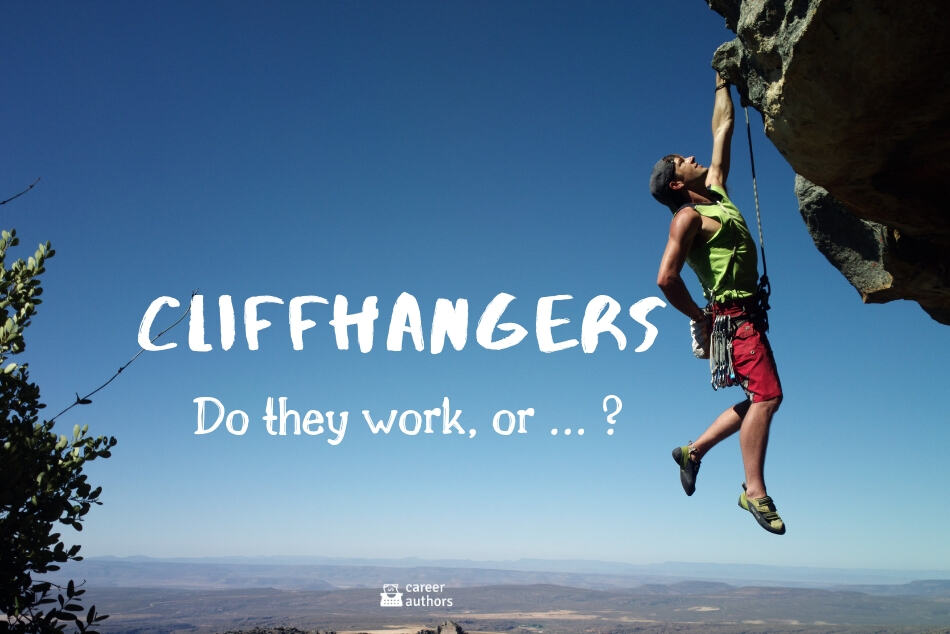Do cliffhangers work, or don’t they? It’s tempting, especially if you are writing suspense or thrillers or mysteries or any kind of crime fiction, even if you are writing a family saga or a journey or a coming-of-age story, to end a chapter with a cliffhanger.
And then she opened the door.
or
That sound—was the train.
or
“I have some news for you,” he said.
But should you—?
But should you constantly use cliffhangers to end your chapters? After all, one of the keys to a compelling book, no matter the genre, is to keep the reader turning the pages. It makes sense, then, that the secret to keeping the reader wondering what will happen next is to flat out have a situation where there is a big build up, but no payoff. It makes sense, doesn’t it, to make them turn to the next chapter to find out whether they escape, or succeed, or even to find out who is on the phone.
Well, maybe not.
Because a cliffhanger is such an “easy” solution, it becomes tempting to do it all the time. But trust me on this, your readers will go crazy. Because in reality, a series of cliffhanger endings quickly becomes annoying, then frustrating, then downright unreadable. Predictable. And amateurish. It is a clear indication that the book is being “written.” It is not seamless, and often a cliffhanger ending sends the message to the reader that they are being manipulated. When you read an ending like that don’t you roll your eyes, and wonder: can’t you do better than that?
Yes, Scheherazade used it to her great benefit to keep the king so intrigued by what happened next in her story that he put off killing her. But wow, after night after night of cliffhangers, you’d wonder why that didn’t make him so annoyed that he might have done away with her anyway.
One door opens and then—
Certainly, you want to keep sight of the fact that your goal is to keep the reader turning the pages. But not to try to trick them into doing that. So as you’re coming to the end of the chapter, when something is resolved and something else begins, think of that moment as sort of a “one door closes as the other door opens” situation.
For instance. Instead of ending your chapter with:
What if you said:
“Father,” she said.
Okay, you can write it better than that. But you see what I mean, and which one makes the reader annoyed. What truly makes you turn the page is giving the reader a satisfying answer to one question, but beginning another intriguing element of the story.
You’ll do better than—
Let’s do another one. And as always, remember, you’ll do better than this.
She grabbed her suitcase, cursing the roller wheels that would not help her at all right now and cluttered down the stairs in high heels and her too-long coat, grasping the handrail and praying.
All she needed was 45 seconds.
With one brave leap and a cry of hold that door, she yanked her wheeled bag onto the crowded club car, feeling the whoosh of air as the glass doors slid closed an inch from her face.
She had done it, she would make it, she would. Now she had 10 minutes to think.
Write fast things slow and—
And if you are a different kind of writer:
She would make it. And now she had 10 minutes to think.
The fabulous Lee Child often says he writes fast things slow, and slow things fast. Sometimes simply thinking about that admonition can help you.
But readers know the writer is trying to tell you a story. Your goal is to get them to yearn to know what happens next. But that desire for answers should come because your story is compelling, not because you used ham-fisted techniques to cram in artificially manipulated suspense.
What do you think about cliffhangers? I think they’re fabulous if used in the right place and at the right time. And the most important thing I think is—
Okay, not funny.
But let’s talk about it on the Career Authors Facebook page. And then—get writing!





